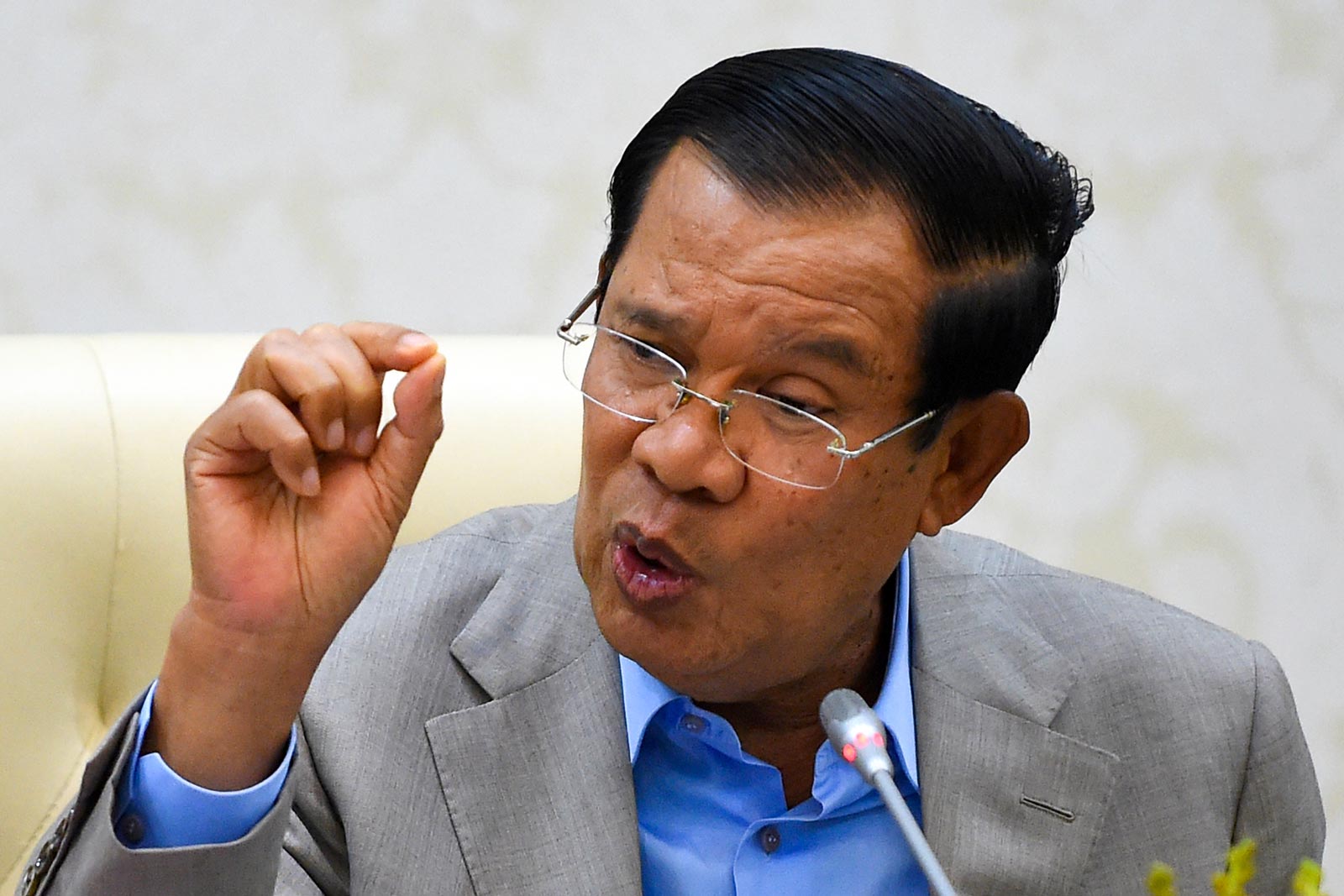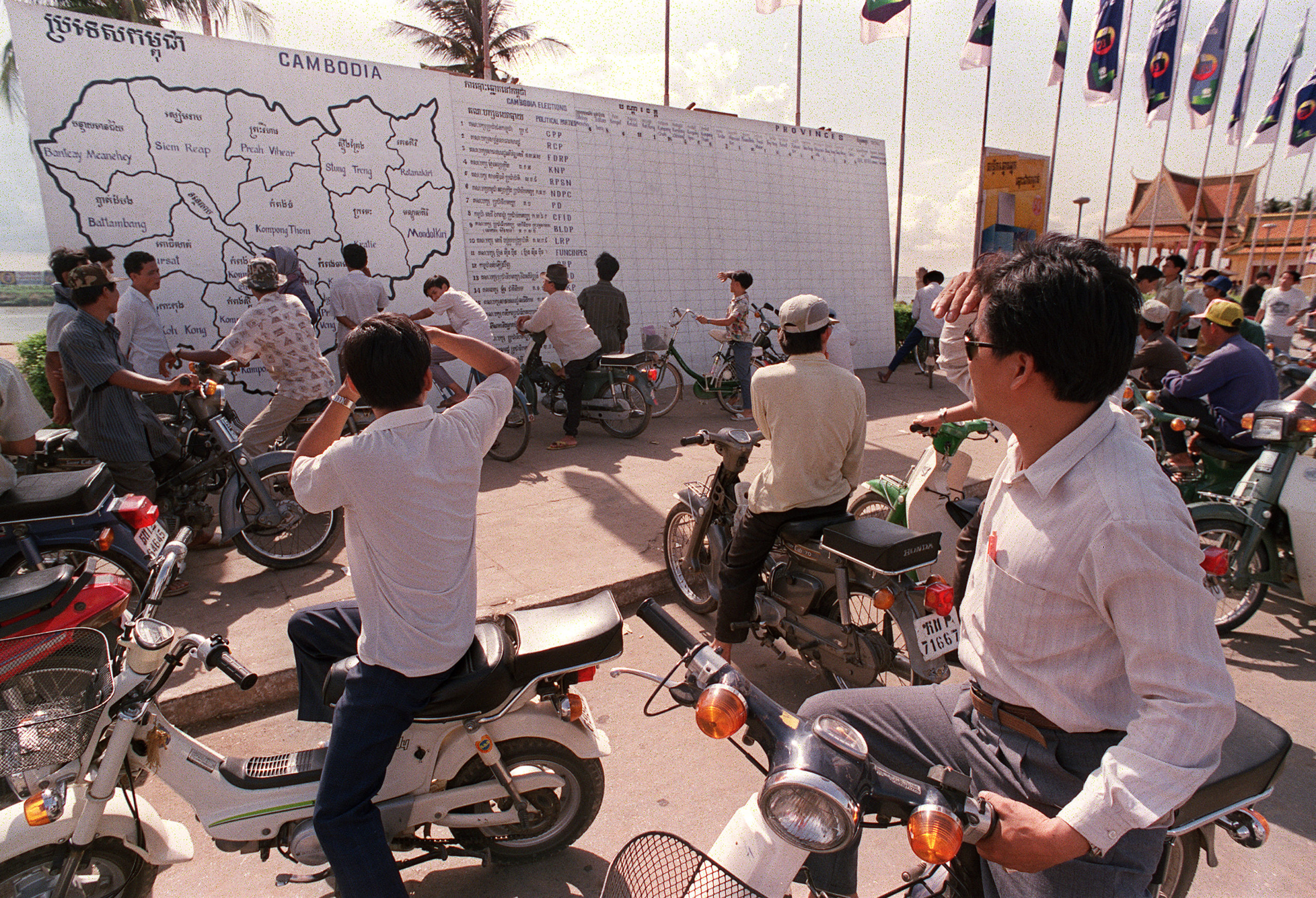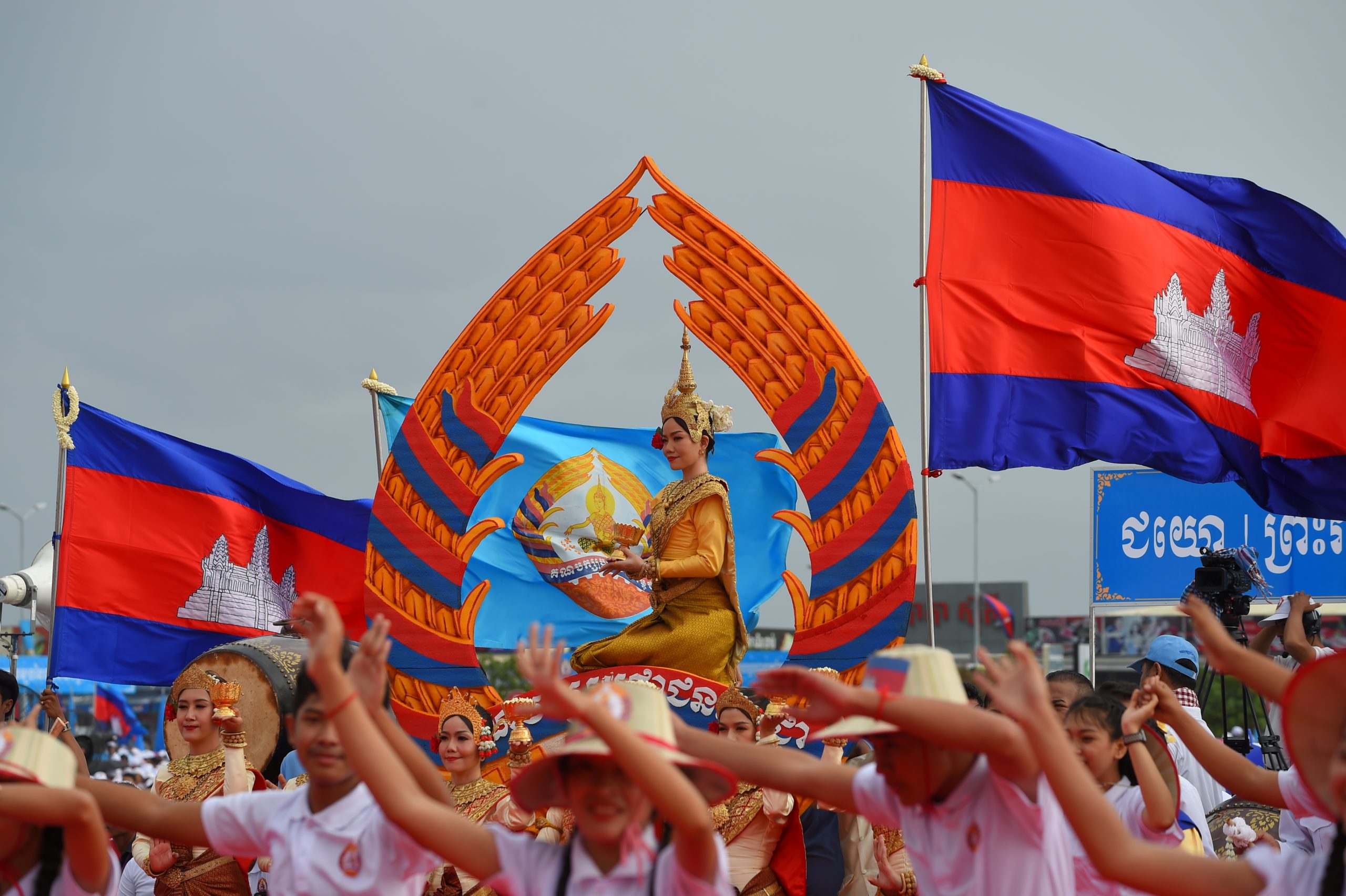Khmer Circle:
All those endless hours spent in smoke-filled Vietnamese embassy rooms in Phnom Penh in the eighties with his Vietnamese tutors are bearing fruits for Xamdaach and, undoubtedly, even more so for his scheming mentors from Hanoi.
But, to be fair, at least, Sihanouk despite his folly and grand blunders had possessed some sort of nationalistic conscience [or 'patriotic conscience' as he once explained himself] whereas Hun Sen couldn't care less about such sentimental luxuries!
Stay around my friend, history never stops to unfold [at any rate, until Cambodia ceases to exist as a national entity of any substance or relevance] and witness her disclosed secrets, hopes, dreams and betrayal.
^^^
January saw Cambodia's Prime Minister Hun Sen mark 35 years in power. Columnist David Hutt examines one crucial tactic of governance that has sustained his more-than three decade rule – the art of giving
DAVID HUTT
FEBRUARY 4, 2020
Hun Sen’s art of giving
G

Cambodian Prime Minister Hun Sen signs the Paris Peace Agreements on 23 October 1991, ending 21 years of civil war in Cambodia. Photo: Gerard Fouet/AFP
On January 14, as Cambodian Prime Minister Hun Sen celebrated his 35th year in power, a feat that makes him the world’s most longest-serving premier, he was obviously distracted by the rumours circulating the Phnom Penh grapevine that he is preparing to soon hand over power to one of his sons.
Most pundits have their money on Hun Manet, his eldest, who in 2018 was made the de-facto head of the military and given an important seat on the ruling Cambodian People’s Party’s Permanent Committee, it’s elite decision-making body.
But, according to Hun Sen, he is going nowhere – in fact, he wants to remain in office for another decade. “We are a democratic country,” he intoned to a room full of journalists. “It is not a country that we transfer power from father to son as some countries do. We have to go through the elections.”
But many would contest this notion. Ever since the CPP, in power since 1979, won all 125 seats in parliament at a 2018 general election just months after crushing its only viable opponent through a Supreme Court dissolution ruling, it has become almost clichéd to talk of Cambodia as a one-party state. In truth, it always was.
The now-dissolved Cambodia National Rescue Party (CNRP) might have won 55 seats in parliament in 2013 and created a fragile two-party political system, but changing representation in the National Assembly was an illusion. What really mattered was that the ruling party maintained its grasp over almost every aspect of the Cambodian state, from the military down to the lowly civil-servant.

Prime Minister Hun Sen delivers a statement to journalists on the government measures against Coronavirus in Phnom Penh on January 30. Photo: Tang Chhin Sothy/AFP
It was during the 2000s, when the CPP’s power was unmatched, that the party perfected one way of blurring the lines between itself and the state.
Travel through rural Cambodia and stop by a public school or hospital; chances are it will be named either after Hun Sen, one of his family members (usually his wife Bun Rany) or a party-connected tycoon – many of whom have been gifted the once royal honorific of “oknha”, meaning nobleman.
Between 2003 and 2016, as many as 4000 of these so-called “Hun Sen schools” were built nationwide. Some public buildings were, indeed, funded by the CPP using the money of tycoons, who were expected to contribute towards the party to pay for infrastructure ($100,000 up until 2017, when the price of an oknha-ship was raised to $500,000).
Yet, most schools, hospitals, bridges and other social projects are either funded by the public purse – and so are paid for by taxation and export revenue – or by the international community, through aid and loans.
But, as journalist Sebastian Strangio wrote in his book, Hun Sen’s Cambodia, “if Hun Sen cut ribbon on a project, it became a ‘Hun Sen project’”.
All this is intended to create the sense amongst the public that there is no welfare state in Cambodia, only a philanthropic party – the CPP. More than that, they are supposed to believe that everything good comes as a gift, which must be earned.
“You have been learning under the schools of samdech; how come you don’t vote for samdech?” Hun Sen enquired to students of Takeo province’s Hun Sen Bun Rany High School in 2016, referring to his royally bestowed title which can be translated as “lord”.
“How can you vote for the others when they have never built schools for you? Please help to tell your parents, too.”
It used to be said of Prussia that it was not a country with an army, but an army with a country. For Cambodia, this can be rendered: not a country with a party, but a party with a country.
Academics dispute what to actually call this system; neopatrimonial; an extractive regime; or a “party-personalist dictatorship”, as Griffith University lecturer Lee Morgenbesser calls it, where everything revolves around Hun Sen.
In layman’s terms, however, the CPP is the state.
“It’s like [Saddam Hussein’s] Baath Party of Iraq at this point,” Sophal Ear, associate professor of diplomacy and world affairs at Occidental College in Los Angeles, told Southeast Asia Globe. “There’s no separation – even if not everyone in the Cambodian state apparatus has drunk the CPP Kool Aid … if you want a job, you have to be a [party] member.”
As Minister of Social Affairs Vong Sauth was making a keynote speech to new civil servants in Phnom Penh in August 2017, he publicly confirmed this, as he engaged in a trait that dogs most ruling party officials: blatant honesty.
“Officials eat the state’s salary, and are asked to be neutral,” he said, “but do not forget that the state was born from the party, and I think all of our officials must have the clear character of firmly supporting the party.”
If anybody does not support the CPP, submit applications of resignation, and I can help you [with that] … But if you are loyal to the CPP you must vote for the CPP, and then you can stay
Minister of Social Affairs Vong Sauth
Consider, for instance, Dith Munty, the Supreme Court chief justice who forcibly dissolved the opposition CNRP. For years, he has sat on the CPP’s elite Permanent Committee, a communist-style Politburo. Most other senior judges sit on its Central Committee, a more bloated decision-making body. Small wonder, then, that the World Justice Project ranked Cambodia as second lowest globally in its 2019 Rule of Law Index, beating only Venezuela.
It’s the same story for the military and police. Then-deputy military commander, Chea Dara, famously said in 2015 that the “army belongs to the Cambodian People’s Party”.
Indeed, the Royal Cambodian Armed Forces is better understood as the military-wing of the CPP. Ahead of the 2018 general election, three of the most senior military officials – Pol Saroeun, Meas Sophea and Kun Kim, who all had sat on the CPP’s Permanent Committee for years – resigned to stand for the ruling party on the ballot. They were duly elected parliamentarians but quickly gave up their seats to become chief aides to Prime Minister Hun Sen and heads of important government working-groups.
Back in 2017, in case there was any misapprehension among them, social affairs minister Sauth continued in his comments to the new batch of civil servants. “If anybody does not support the CPP, submit applications of resignation, and I can help you [with that], but if you are loyal to the CPP you must vote for the CPP, and then you can stay.”
One can grasp exactly how senior CPP officials feel about “independent” state bureaucrats from these comments. But let us linger on Sauth’s earlier phrase, “the state was born from the party”. It was, indeed, the CPP – albeit under its preceding guise as the Kampuchean People’s Revolutionary Party (KPRP) – that created the modern Cambodian state.
On January 14, 1985, Hun Sen was named prime minister of what was then called the People’s Republic of Kampuchea, a state officially founded in 1979 after Cambodian defectors (including Hun Sen) and Vietnamese troops overthrew the genocidal Khmer Rouge regime.
In just four years, the Khmer Rouge, in its Maoist delusions, destroyed the entire Cambodia state apparatus and murdered any person that might have been part of it. What Hun Sen and his clique inherited in 1979 was something of a tabula rasa – a country with no civil service, no courts or judges, no police, no schools and no hospitals. Even the monarchy wasn’t to return for another decade.
By 1989, with the guidance of communists in Hanoi, it had refashioned the entire Cambodian state with all institutions and officials loyal to the party – as is the case in all communist states. That was supposed to change in the early 1990s when the UN took over running the country until elections were held in 1993. But they were a charade.

Commuters waiting for election results gather on May 30 1993 around the official election scoreboard in front of the Royal Palace in Phnom Penh. Photo: Romeo Gacad/AFP
So-called “A-Teams” slaughtered more than 200 opposition activists between November 1992 and May 1993, according to Human Rights Watch. Yet when the ballots were counted, the recently renamed CPP still came second. The royalist party FUNCINPEC had won, albeit with a hung parliament. Not accepting the people’s will, Hun Sen threatened to lead several provinces in secession and kicked up such a fuss that he was allowed to form a power-sharing relationship, with himself as co-prime minister.
Yet since the CPP had controlled the state apparatus for more than a decade, FUNCINPEC struggled to assert any power. Most senior police and military officials were all CPP members, while civil-servants had for a decade been taught that party loyalty was sine qua non in their profession. But that wasn’t enough for Hun Sen; in 1997, he took back full control of the state in a bloody coup.
Hun Sen is nothing if overt. Back when the ruling party tolerated choice in elections, it was also typical for villagers to be reminded by CPP campaigners that if their commune voted against the ruling party, they shouldn’t expect any new investment.
“They give if they win the elections, but not if they don’t,” one respondent was quoted in a December 2016 study on this practice. Yet the same report – by the Swedish academic Astrid Noren-Nilsson and published in Pacific Affairs journal – argued that this quid-pro-quo of handouts in return for votes was weakening, with many voters conscious of its bare-faced manipulation and frustrated by the practice.
The fact that 2.9 million voters opted for the opposition CNRP – to the CPP’s 3.2 million votes – at the 2013 general election indicated that a swathe of the public could imagine (even desire) a state not dominated by the ruling party. Then, when the CNRP secured another stunning result at the 2017 commune election, ending the CPP’s near monopoly on locally-elected seats, the ruling party most likely realised its patron-client system with the public was crumbling – and decided it was time to crush its opponent.
Not that the philanthropic practices entirely went away, and a month before the 2018 general election, Hun Sen handed out $5 “gifts” to the thousands of factory workers who attended his hustings. Huy Vannak, undersecretary of state at the Interior Ministry, responded that the cash payments were “government money” – an observation that shows even senior officials don’t understand where state money begins and party funds end.
But as Cambodia develops, it’s becoming harder for the CPP to continuing blurring the lines between their party and state.
Of course there are good people inside the CPP; people who know right from wrong and who are competent. But until business as usual ends, they will never be in charge
Sophal Ear, associate professor of diplomacy and world affairs at Occidental College in Los Angeles
Needing more state investment if Cambodia is to maintain progressing – the state budget of $8.2 billion this year is almost triple 2013’s budget – the government now has to turn to higher tax revenues, which rose to around $6 billion last year, almost double from 2017.
While there may be no repeat of the “no taxation without representation” ethos (which appears to be confined to American history) but one might expect a greater recognition going forward amongst Cambodian taxpayers that it is their money, and not the ruling party’s, that is paying for new infrastructure and social services.
One simple reform touted for Cambodia to disentangle state from party is to prohibit public servants from belonging to political parties. That would be a mere cosmetic change, however, argues Sophal Ear.
“Of course there are good people inside the CPP; people who know right from wrong and who are competent. But until business as usual ends, they will never be in charge,” he says. “They [public servants] are never going to be given real power; only doing work that will provide a facade of legitimacy to the state.”
Reform would irrevocably alter political dynamics for the CPP too. The promotion of genuinely independent judges would remove their ability to use the courts to do the party’s bidding. Promoting independent military officers would remove the ruling party’s constant promise to respond lethally to any political threat. And how would truly independent civil-servants deal with issues that are politically sensitive and which could weaken the party in the eyes of the public?
Indeed, the CPP has no intention of weakening its own hand, according to Paul Chambers, a political analyst at the Center of ASEAN Community Studies, Naresuan University in Thailand.

Cambodian dancers perform during a ceremony marking the 68th founding anniversary of Cambodian People’s Party in Phnom Penh on June 28. Photo: Tang Chhin Sothy/AFP
“The only chance to establish a bureaucracy built around merit rather than partisan loyalty to the CPP would be for there to be a change of regime which ended the power of the Hun family and the CPP altogether,” he says.
“But that is highly unlikely at the present time.”
Civil society is also increasingly being drawn into the CPP’s web, with the ruling party, or its main ally the Chinese Communist Party, funding numerous new think-tanks and NGOs in recent years, filled with academics who know professional advancement comes through party patronage.
Much of Cambodia’s long-independent civil society – well-funded by US money and that has historically been unafraid of raising its critical voice – has now either been crushed or silenced, and the CPP wants to take over what’s left.
In December, party members gathered at the Exhibition Hall on Phnom Penh’s Diamond Island to take part in the “Mass Movement Congress”. Party spokesman Phay Siphan described it as a “bridge linking the party to all citizens so that they understand our political platform and gain confidence in our leadership”. More accurately, they discussed ways for CPP to construct itself as a mass-movement party.
Planned amendments to Cambodia’s Law on Trade Unions, for instance, will bring even more unions under the CPP’s control. While this month, Hun Sen said he now adores reporters and promised to provide state-funded legal aid to journalists, though only those who “work hand-in-hand with the government to fight injustice for a better society“. Clearly, his ambition is to bring more loyal and obedient journalists into his mass-movement.
In 2018, after the CPP secured its political supremacy, I predicted that it would transition into something that resembled the Sangkum Reastr Niyum, the political party-cum-mass movement led by Norodom Sihanouk that dominated politics between 1955 and 1970.
Sihanouk achieved this by banning opposition parties, winning every parliamentary seat in four straight elections until toppled in the Lon Nol coup of 1970. But what bound it all together was “personal loyalty” to Sihanouk “as doctrine”, wrote Charles Meyer, a former adviser to Sihanouk, in his 1971 book Behind The Khmer Smile.
This is now what the CPP is trying to achieve; a mass-movement where the state and civil-society share the party’s only doctrine: loyalty to Hun Sen. So if Hun Sen was to utter the chilling words “l’etat, c’est moi” of French monarch Louis XIV, it would be a rather accurate description of the state of Cambodia today.

1 comment:
Look at Ah Roleuy Hun Sen's face. This asshole Hun Sen can barely read Khmer.
How can he read and sign any agreement ???
Post a Comment